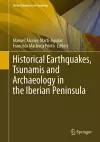
Historical Earthquakes, Tsunamis and Archaeology in the Iberian Peninsula
2 contributors - Hardback
£159.99
Manuel Álvarez-Martí-Aguilar is a lecturer of Ancient History at the University of Malaga (Spain). His research interests include the historical process of Tartessos and Phoenician Iberia, as well as the modern historiography of the ancient world. In recent years, he has been leading a line of research on the impact of historical earthquakes and tsunamis on the coastal communities of the Iberian Peninsula, as the principal investigator of the projects TSUNAMIGAD - The Tsunami in the Cultural Representations of the Ancient World: Gadir-Gades and the Gulf of Cádiz as a Case Study (HAR2015-66011-P - MINECO/FEDER) and TSUNIBER - Earthquakes and Tsunamis in the Iberian Peninsula: Social Responses in the Longue Durée (PGC2018-093752-B-I00 - MCI/AEI/FEDER, EU). In these projects, he has analysed the symbolic keys to the perception of tsunamis in the ancient world, studied the apotropaic responses to this type of phenomenon and reviewed the catalogue of historical earthquakes and tsunamis in the Iberian Peninsula.
Francisco Machuca Prieto is a postdoctoral fellow at the University of Malaga (Spain), where he obtained his PhD in 2017 with a dissertation focusing on the identity building of the Phoenician communities of the Iberian Peninsula in the context of their integration in the Roman world. His main research areas are as follows: identities and ethnic construction in the ancient world, the Phoenicians in the Western Mediterranean, the Roman presence in the south of the Iberian Peninsula and the historiography of Antiquity. He is a member of the Historiography Studies Group (PAIDI HUM-394) and a team member of the projects TSUNAMIGAD - The Tsunami in the Cultural Representations of the Ancient World: Gadir-Gades and the Gulf of Cádiz as a Case Study (HAR2015-66011-P - MINECO/FEDER, EU) and TSUNIBER - Earthquakes and Tsunamis in the Iberian Peninsula: Social Responses in the Longue Durée (PGC2018-093752-B-I00 - MCI/AEI/FEDER).